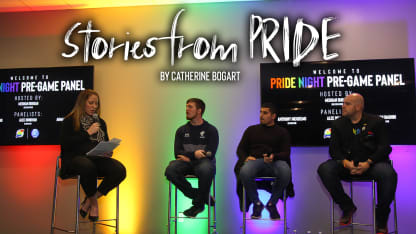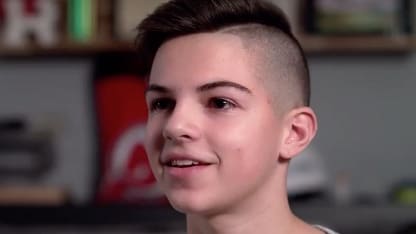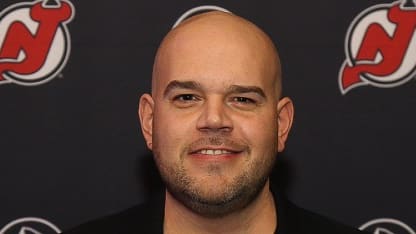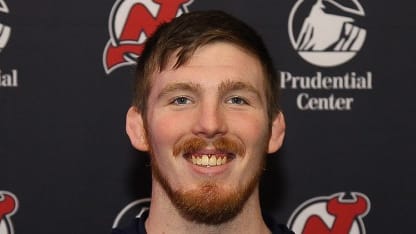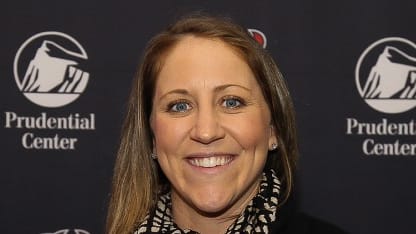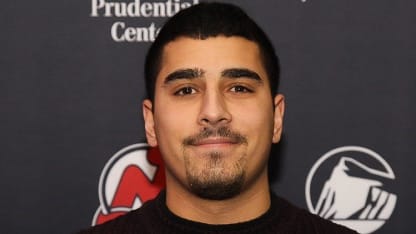For Eli, a 15-year-old from North Jersey, hockey is everything.
It's how he met his friends and how he spent time with his brother when they were younger.
"Growing up, I always saw my brother playing and I was like, 'oh, I want to do that!'"
Eli's brother would use pillows instead of pads, a baseball glove instead of a goalie glove, and send him in net to practice on him.
"Since then I've been in love with the sport and it's the best thing to ever happen to me."
Hockey is more than just a game Eli plays and a sport he loves. It's a support system and a community that has allowed him to be authentically himself.
"I'm fifteen years old, and I'm trans."
"I always had this feeling that I was a boy and I was, you know, more masculine. In knowing that I ended up sort of finding the words to tell my parents and tell my friends."
Eli told his mom he was trans when he was eight years old. His mother, Grace, then told Eli's father, who told Eli's older brother. Once the whole family knew, it was a moment of relief for Eli.
"It was totally just like a weight lifted off my shoulders when I was able to tell them. At that point, they knew, and I knew they would try to make the steps to progress me in my transition whether medical or social. They made me feel totally accepted. I was really privileged to have them on my side."
Eli and his family started a two-part plan for his social transition. The first part focused on telling Eli's closest friends and their parents. The family brought everyone together at their kitchen table and talked about his true identity. Eli's friends were all very supportive and accepted him for who he was.
The second part of the social transition plan focused on school. Eli and his family worked with school administrators, teachers, and faculty to implement training and education on everything from proper pronouns to how to support Eli.
The day Eli transitioned, he didn't go into school. School officials and teachers talked to everyone about Eli, his proper pronouns, and how to support him. When Eli returned the next day, his classmates showed him how much they accepted him.
"The day after I received a stack of index notecards and every single one of them was a note from all of my classmates saying how much they support me, and how they're going to love me, no matter what name I use, no matter what pronouns I use. They're always just going to support me. And you know that's something that was really huge to me."
Eli's hockey team and coaches were just as accepting as his classmates and teachers were.
"All my hockey teammates were all crazy supportive. Another situation where they were like we kind of knew, you're one of the guys."
"It was super huge to have all my coaches on my side, all my teammates. I never really once felt unsafe in a locker room or in a locker room environment. I feel really privileged to have that."
After his social transition, Eli's medical transition was next.
"The next step for me at least in my personal transition was having a medical transition which involved hormone blockers and testosterone."
"I guess my voice dropped a little bit," said Eli after a year of taking testosterone. "There's still a pretty long way to go in that department but I'm happy."
Although only fifteen years old, Eli has become an advocate for LGBTQ rights. He likes to share his story and his life to show others they're not alone in their transitions. The same way he feels supported by his favorite NHL team.
"Having an NHL team, a team like the Devils, who I love through thick and thin, and always love the Devils. Having a team like that being so supportive and having nights like Hockey is For Everyone and having Devils Pride Night is huge. Having support through institutions and teams, I think that is the groundwork for bringing up support through other people."
"Even having one night, where you have the logo with rainbow colors on it, it's really huge."
When asked, Eli said the biggest thing he likes to remind people is, although there have been physical and social changes, he's never changed.
"I've always been the same person. No matter what your pronouns are, who you identify as, you're always going to be the same person inside. I think that's all that really matters."

